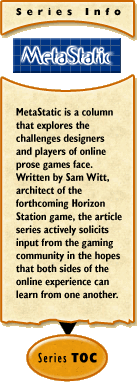 The Art of Tools
The Art of Tools
by Sam Witt
December 6, 2000
One of the things I disliked the most about writing for pen-and-paper roleplaying games was the sense of stagnation I kept running up against. When dealing with an essentially static medium, I was frustrated by my inability to give the players enough choices. No matter what I wrote, or how many variable endings or subplots I tossed out, there just wasn't a way to give all the options I really wanted to present.
To this day, it bugs me that some projects I worked on only told one story, when I had in mind a hundred tales I'd like to tell. There wasn't space or time, and honestly, most of my goals at the time were completely unreasonable. The books I would have written would have weighed in at hundreds of pages, a great deal of which would have been unused by the majority of the players.
Fortunately, I have the chance to indulge some of my wilder ideas now, simply because the environment I'm working in is dynamic. And that let's me work on all sides of a story, or better yet, let's me not tell a story at all.
I've long considered roleplaying games to be an art form, not for what the designers did, but for what they allowed the players to experience. The best games are the ones that provide a toolkit that the players can use to build dramatic experiences of their own. They are about empowerment, not restriction, options, not limitations.
Which is a roundabout way of saying that I do not think that online games should be about stories told to the players. As a designer, what I want to provide is the framework that players will use to hang their own stories. The real art, for me, is not to be a storyteller but a story-enabler.
And that's where the real joy lives, in watching players take the tools that the designer leaves lying around and watching them build something. The question is, which tools the ones that players really want? Below are a few that I've seen to be very popular - use the forums to add to the list.
- Houses. Players love houses, because it gives them a place to make their own. Not to mention that they double as bars, inns, gambling dens, and other interesting locales that might not otherwise exist.
- Trade Skills. Building things is just cool, because it provides a semi-tangible thing produced by a character. Done properly, these things become the basis of an economy, and skilled characters are rewarded appropriately.
- Sub-Games. There is something extremely satisfying about playing games within games. To me, it adds a layer of depth that isn't easily replicated by any other method.
- Rare Items. This is a hotly debated topic, but the usefulness of rare items far outweighs the problems they cause with haves and have-nots. Rare items provide a sense of history to the game world, as well as the characters who possess them.
- Secrets. The greatest tool a game designer can provide to their players is a useful secret. Things that can be uncovered only by the skillful or resourceful, and which provide a real, tangible, manner of affecting the world.
There are many others I know I left out, but it would take me pages and pages to detail them all. Besides, this column is about eliciting yelps and screams from its readers about what a gleeb of a designer I am. So use the link below to tell me what you think are the tools that online players need to turn their games into art.



